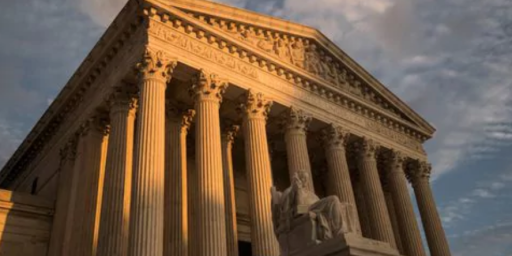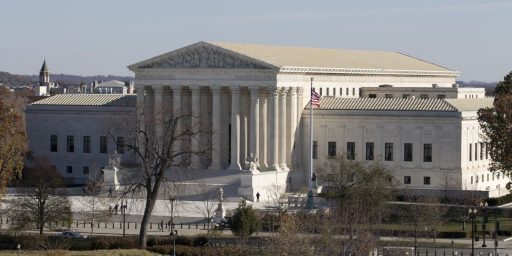There’s Too Much Money In Politics Because There’s Too Much Politics In Money
Do you want to get money out of politics? You need to get politics out of money.

In a recent column, George Will took on the old canard about getting money out of politics, and pointed out that the reason that there is so much money “in politics” is because politics and government have their fingers in virtually every aspect of American life:
The progressive catechism teaches that there is “too much money” in politics. A codicil to this tenet, written in fine print, is that the term “money” does not apply to money from George Soros, government employees unions, private-sector unions, trial lawyers, Democratic-oriented private-equity firms and white-shoe law firms, Silicon Valley executives or entertainment celebrities.
The catechism does not include the truism that the way to reduce the amount of money in politics is to reduce the amount of politics in the allocation of money and of opportunities for making it. This would eviscerate the progressive agenda, which involves government, a.k.a. politics, redistributing wealth, regulating the creation of it and rescuing “fairness” from “market failure,” a.k.a. markets producing results that progressives dislike.
The same is true of conservatives, of course. Leaving aside the small and, in the era of Trump, disappearing segment of conservatism that is actually fiscally conservative, Republicans have demonstrated that they too seem to believe that they know what to do with the tax dollars of the average American than the average American does. In this case, that means spending money on an already bloated military budget that surpasses by several orders of magnitude the spending of any other nation on Earth, including the combined budgets of our primary geopolitical adversaries Russia and China. (North Korea and Iran, by comparison, spend so little on their military that they aren’t even worth mentioning.) In many cases, this spending amounts to little more than corporate welfare for defense contractors that exist for no purpose other than to keep these companies in business. Additionally, conservatives and Republicans often advocate for tax subsidies and other expenditures to benefit favored industries such as the petroleum industry, pharmaceuticals, and other similar industries.
In addition to all of this from the left and the right, there is another reason that businesses and other special interests invest so much in politics and lobbying. The regulatory state, which has taken away much of the power that used to reside with Congress, has its fingers in virtually every aspect of American business and the American economy. While there are many areas, such as food and drug safety, where this is arguably necessary, it’s also clear that many of these regulations, and the laws that authorize them, are being used to reduce competition in specific industries and which are clearly designed to benefit specific companies. This is true of nearly every area of law, including patent and copyright law which has been manipulated by market leaders to provide them with a monopoly long beyond the period that the Founding Fathers likely intended when they authorized Congress to issue such protections. This is why, for example, the movie, television, and music industries and the pharmaceutical industry spend so much on lobbying, because its the easiest way to manipulate the laws to their favor.
It’s also worth noting that business interests are not the only bodies that spent millions of dollars per year campaigning for, donating to, and lobbying politicians. We also see the same thing from labor unions, social organizations, citizens groups, and other entities and groups of people doing whatever they can to influence the direction of policy in Washington, D.C. and the capitals of the fifty states. Again, this is because government at both levels has grown to the point where there is virtually no aspect of life where it doesn’t involve itself, meaning that there are countless numbers of interest groups who have an incentive to see policy bent in the direction that they favor regardless of whether or not that direction is good for the nation as a whole or, indeed, for the majority of Americans.
In the end, of course, we’re not going to get politics completely out of the business world any more than its likely that we’re going to get money out of politics. However, if you really want to reduce the influence that big business has over government then you need to start looking at reducing the ability of the state to hand out favors and pick winners and losers in the marketplace. Until you do that, business interests will continue to try to use money to influence politics to their advantage. And, more often than not, they’ll win.






The problem is worse than most people realize. You cite here the sources of money that are at least semi-public, just the tip of the iceberg. Think of all the work and all the jobs that businesses are able to offer to family and friends of important politicians. All those generals (and lower level officers also) who leave the military and go on to take 6 figure jobs or better with contractors. Those cabinet officials, congressional aides, etc who go on to cushy, well paying jobs in industry. So however bad you think it is, it is worse.
As an aside, I find that I have a lot of respect for Soros. He gets cited in almost every article like this. I have no idea where the guy gets the time and energy, let alone the money, to be at the heart of every liberal/socialist conspiracy and effort in the US, and much of the rest of the world. The guy must never sleep and work like a dog.
Steve
Yes. Let’s get politics out of society!
This is actually pretty silly.
All joking aside, like a lot of libertarian “thought” (and I’m using that term loosely here), less government (rather than better government) sounds nice in theory, but sucks in practice.
For instance, you’re bringing up the issue of copyright:
Does this mean that we should stick with 18th-century standards? If not, what does it mean? “Neutral” legislation only? But what is “neutral” except for the status quo? And who says that the status quo is even fair?
So yeah, let’s try to get get money out of politics rather than politics out of money.
After all, quite a few other countries manage to do this reasonably well.
On may 28, 1995, a copy of Reason magazine fell into a mysterious hole in the space time continuum outside of Witchita, Kansas.
On may 28, 2019, a hole opened up in the sky, this article fell out, and landed on this blog.
The phenomenon was never explained.
Yes, our rules are fair. Charles Koch and the SEIU can both spend unlimited money on politics. Of course only Charles Koch has essentially unlimited money.
Read Piketty. The rich are getting richer and they are going to buy what they want, including the government. Amongst the verities are:
– Bothsides applies, no matter how asymmetric.
– George Will is a twit. He’s one of the nation’s leading conservative intellectuals. Which says more about conservatism than about Will.
I should add that George Will, being the right-wing hack that he is, isn’t taking a principled stand against either money in politics or politics in money.
Will is simply defending the status quo, because currently the GOP is getting much more out of it than the Democrats. Moreover, he is just using whatever silly nonsense is convenient to make his point (“Soros, trial lawyers, argle bargle”).
Today, it just so happens that his argument has a libertarian tinge to it, with the result that libertarians immediately start carrying water for the reactionaries (read: GOP) who couldn’t care less about anyone’s freedom but their own.
It’s a pattern.
@steve:
Orwell predicted him. He’s Emmanuel Goldstein from 1984.
It’s not just that business put a lot of money into politics; it’s that putting money into politics becomes expected when a business gets too large. I remember, twenty years ago, when the government made their absurd anti-trust case against Microsoft. The main reason for it, as everyone knew, was that Netscape was playing the Washington Game and Microsoft, at least at that point, was not. The response was basically, “Who does Microsoft think they are, not coming to Washington and giving their tithe?” Now MS plays the game and uses it to step on everyone else. Will is right: every time we expand government power, the Left is perplexed that said power favors the wealthy and powerful.
It’s notable that many businesses and industries donate to both parties. That’s called hedging your bets so that you’re untouchable no matter who is in power.
(The genesis of Will’s column is Gillibrand’s attempt to revive her dead campaign with “Democracy Dollars” which is a silly and terrible idea that we tried before and failed.)
Much of the “money in politics” concern is just another variation of the Fundamental Progressive Belief: that the only reason people disagree with progressives is because they’ve been brainwashed or bribed by nefarious interests. We’ve seen over and over again that money has only a weak connection to electoral results (if any at all) and that money tends to follow politicians’ beliefs rather than the other way around. It’s not that it isn’t a problem; it is. It’s that it not THE problem underpinning everything else.
@steve:
Same place the Koch Brothers do.
BS! It really takes a complete ignorance of the world, the real world, to think that corruption must follow in the wake of any highly regulated state, and cannot exist in unregulated ones. A country’s wealth directly follows from the ability of the government to enforce standards and maintain order. As Steven said only yesterday, people need only vote with their feet and move down to Louisiana to see freedom in action.
If we’re going to live in an ‘unlimited money = unlimited free speech’ world then I think it’s reasonable to require that every political contribution should be fully disclosed, and in a corollary, every contribution to a PAC or an ‘umbrella’ organization should be fully disclosed too.
I think that certain libertarians and anti-government pro-market types believe what they say. But the bottom line is that the state created the market and unless you are deluded, corruption is going to happen with money. At best, these are people who are upset about human existence. It’s like saying capitalism before the progressive reforms did not at all have any favoritism, which is news to how capitalism worked in the 19th century. Even if you cross out slavery or government-backed imperialism, you still have class, which is a thing that is maybe, slightly, you know–corrupt.
Kinda lost interest here after Will’s introduction with the ridiculous strawman. I guess he’s trying to earn back his con credentials or something, but it’s a pathetic look.
@Hal_10000: I have a very different narrative for that anti-trust suit. Microsoft was trying to claim ownership of the internet by making it very hard for competing browsers to get a foothold. This would have been bad for the competition, and bad for consumers. Their vision of what the internet should be would have been so much worse than what we have now with Facebook.
Put me down as somebody who thinks no one company or person should be able to become the gatekeeper to the internet, and I am the enemy of all who try to do that. And there are lots of people who try to do that.
And by the way, I am not averse to individual websites and platforms setting standards for their platform, as long as signing up for their platform is not required to use the internet.
Microsoft performed poorly in the courtroom for that trial, according to the opinion of many of my lawyer friends. Because they weren’t used to having their technical worldview challenged. (Read, they thought they could pull a snow job on non-technical judges.)
I’m less anti-MS these days than I was then, but claiming that the browser was an indivisible part of the OS was completely transparent bullshit. If your thought is that “enough lobbying money can turn bullshit into Gods Truth”, then you’ve articulated the reason I think there’s too much money in politics.
@Jay L Gischer: there were discussions internally at Microsoft in the 90’s about how they could rig it so that Microsoft owned crucial web standards and could then demand a cut of every transaction that happened over the internet.
Their plans got stymied in part because of the antitrust action, so people don’t realize the heinous shit they were up to.
Dean Baker has been arguing lately that the drug industry is turning into a multi trillion-dollar exercise in rent-seeking, and we would be better off if the federal government just straight-up financed the hundred billion per year in R&D and then made basically every medicine basically free. it’s hard to justify $500 epinephrine pens and people having to ration their insulin, or, as AOC pointed out, pills that cost $8 in Australia and $1,000 in the US.
Conservatives will never understand that a government that could manage a small, rural country mostly comprised of farmers is simply not going to work for a large, urban post-industrial nation. There are endless examples of unregulated capitalism leading to disaster but they refuse to see it.
@HankP: yep. Not having an EPA in the year 1800 just meant that maybe you’d feel a little woozy because Farmer Brown dumped a few gallons of turpentine a mile upriver. Not having an EPA in 2019 means that the CEO of Amalgamated Global decides that dumping their 87 million gallons of 2,4-ChloroBenzoArsenoCyanide in the river will net shareholders 4¢ more per share and he can trade in that stupid Gulfstream 4 for an awesome Gulfstream 5 with Hermes interior.
@gVOR08: AFAIK, none of the nefarious groups that lean Democratic had anything to do with crashing the economy in 2008. Of course, perhaps Will is clairvoyant and he knows that the next recession will be the fault of these groups.
Doug, I think George Will and you have cause and effect mixed up here. The argument here seems to be if government touched less of our lives, then the rentiers wouldn’t pour so much money into government. Couldn’t the argument just as easily be that government touches so much of lives, because politicians are being paid to create favorable policy for the monied interests?
Hard to believe that even George Will is this stupid. Occam’s Razor suggests that he’s really just corrupt. Directly and indirectly, the con benefits him.
I wonder if he’s actually read the sections in The Wealth of Nations that talk about the necessity of regulation…
@Teve: To me, the most interesting thing about prescription drug prices is that they are all over the map even in the US. I take Digoxin for my heart rate and have purchased it at 3 different pharmacies over the past 4 years. The pharmacy I go to now lists the cost of a 30 day supply at $75, Kaiser pharmacy listed it at $27, and Safeway listed it at $175. This medication has been generic for about 35 or 40 years; where does the fluctuation in price come from? (For what it’s worth, the copays have been $3 currently and $10 and $5 for the other pharmacies, respectively.)
@DrDaveT: There are sections in The Wealth of Nations that talk about the necessity of regulations?
(Yes, I actually do know this.)
@Teve: Yeah there was a reason a lot of computer geeks hated M$ as it was called. They were outright trying to be as “evil” as possible because PROFITS!!!
It’s kind of amazing to look back because MS is now a company that invests heavily in open source communities. They are far from the evil corporation they were in the 90s.